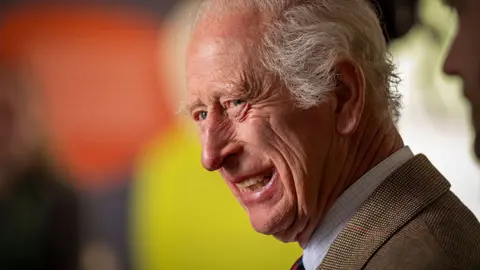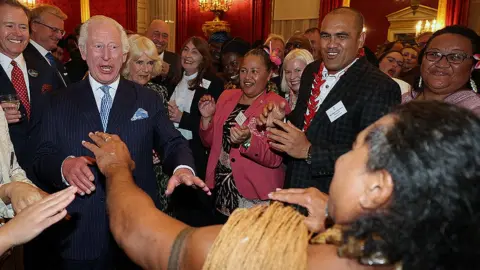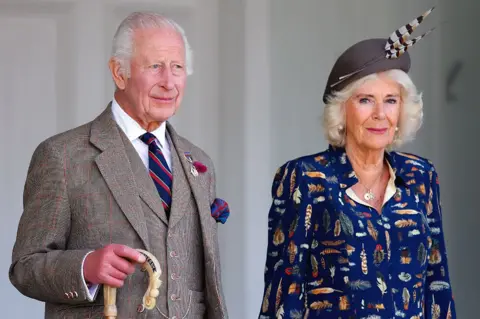King Charles’s Australia tour – and why it nearly did not happen

 Getty Images
Getty ImagesKing Charles III and Queen Camilla are due to arrive in Australia on Friday on a historic royal tour.
Eight months ago, I didn’t think I’d be writing those words.
In February, Buckingham Palace announced the King had cancer and all his “public-facing duties” stopped – on doctors’ orders.
Back then, a trip to Australia seemed unthinkable. A flight of around 24 hours, a punishing time difference, and days of royal engagements would surely be too much for a 75-year-old dealing with a cancer diagnosis and embarking on treatment.
But palace aides never took this trip completely off the table – whenever it came up, their language was careful. “It’s not been ruled out”, they’d say, or “decisions will be made on the advice of doctors”, and “the King needs to focus on treatment for cancer first”.
And by late Spring, there were signs the visit might still go ahead.
Some of the King’s team travelled to Australia and Samoa to assess what was possible and finalise arrangements, liaising with the Foreign Office and both the Australian and New Zealand governments.
Would the King be well enough to cope with the rigours of the tour? The answer was yes – with some important changes.
On medical advice, New Zealand was removed from the schedule. Buckingham Palace said it was a choice made “in collaboration” with the Australian and New Zealand governments, and acknowledged it was a “tough decision”.
Royal aides have been open about the King’s diagnosis and treatment but they have never revealed the type of cancer the King has nor offered details of the kind of treatment he’s receiving. “His health is on a positive trajectory,” they tell us.
What is clear is the King’s treatment is ongoing and his cancer requires regular medical management. But he is well enough for his doctors to sanction this trip, and while he is away his cancer treatment has been paused.
Removing New Zealand and keeping this trip short means he can return to his regular routine of treatment as early as possible.
 Getty Images
Getty ImagesThe programme of events for the King and Queen also looks a bit different from regular royal tours. When they arrive they will have a day to recover before starting engagements. It’s a long journey – they are both in their 70s and the day off is again a nod to the King’s condition.
The timetables in Australia and Samoa do not include evening engagements. There are no state dinners, and no trips out late in the day. But we will see more of the King over the next nine days than we have for most of this year.
Buckingham Palace says a lot of thought has gone into “balancing the programme” and it has been planned to “preserve the King’s energies”.
This is Charles’ first visit as King to one of the 14 realms where he remains Head of State. It will also be his first Commonwealth Heads of Government Meeting (CHOGM), where he is head of the association of 56 countries.
The King’s reign has been compromised by his cancer diagnosis, but this trip gives a real sense of him being back in business.
 Getty Images
Getty ImagesAs well as doctors’ orders, the King has also had to operate under the Queen’s orders. His wife has found herself going solo more than she might have anticipated this year, continuing with several engagements she was due to carry out alongside her husband.
Queen Camilla is an influential figure within the royal household and has referenced her husband’s “workaholic” mindset at several public engagements – even after his cancer diagnosis.
She has been key to ensuring the King follows medical advice and takes time out to recover during his treatment. And she will be doing the same in Australia and Samoa over the course of this visit, as well as taking on some of her own engagements around issues including literacy and supporting victims of domestic violence.
Royal tours require precision planning. There is a choreography to them and a check list of moments to hit – parliaments, dignitaries, military, environment and culture.
On paper, the Australia element of this trip is traditional and safe territory. But it is also significantly different from what has gone before.
The King first visited Australia in 1966 as a 17-year-old starting two terms of teaching experience at a private school in Victoria. He returns as a 75-year-old monarch receiving treatment for cancer, towards the end of a year during which he has faced immense personal challenges.
His public life has been restrained, restricted by illness. And although his schedule became busier as he progressed with his treatment, he then retreated to the solace of Balmoral for a summer break and to prepare for this trip.
“How’s the King doing?” is a question I have been asked repeatedly this year – and it’s been tricky to answer at times.
The coming days will allow us to see the King at work day after day. Up close, a head of state, King of Australia.
This tour is are big showcase for the monarchy, and monarchies need to be seen – even more so in a country where an Australian republic has been an active topic of political debate in recent times. The optics matter for Buckingham Palace.
A King looking well, engaging with the public, managing a full timetable of events, doing some soft diplomacy and embracing what Australia and Samoa have to offer is the goal.
Getting here hasn’t been easy. But there is confidence from royal aides that this visit will give a strong sense of normal service resuming.

#King #Charless #Australia #tour #happen
News plays a pivotal role in our lives by keeping us informed and connected to the world. It serves as a critical source of information, offering updates on current events, politics, economics, science, and more. Through news, we gain awareness of global issues and local developments, helping us make informed decisions in our personal and professional lives. News also fosters discussion and debate, encouraging critical thinking and perspective-taking. Moreover, it promotes transparency and accountability among governments, businesses, and other institutions. In a rapidly changing world, staying updated with the news enables us to adapt to new challenges and opportunities, shaping our understanding of the complexities of society. Ultimately, news is not just about information; it empowers us to participate actively in the world around us, contributing to a more informed, engaged, and responsible global citizenry.
Health is fundamental to our well-being and quality of life, making it an essential aspect of daily existence. It encompasses physical, mental, and emotional aspects, influencing our ability to function effectively and enjoy life fully. Prioritizing health allows individuals to maintain optimal physical fitness, reducing the risk of diseases and promoting longevity. Mental health, equally crucial, affects our cognitive abilities, emotional stability, and overall happiness. Investing in preventive healthcare through exercise, balanced nutrition, and regular medical check-ups helps in early detection of potential health issues, ensuring timely intervention and treatment. Beyond individual benefits, a population’s health impacts societal productivity and economic stability. Governments and organizations worldwide emphasize public health initiatives to address pandemics, health disparities, and promote overall well-being. Ultimately, health serves as the foundation upon which we build our lives, influencing our ability to pursue goals, nurture relationships, and contribute meaningfully to society.
Money plays a crucial role in our lives as a means of financial security and freedom. It enables us to meet basic needs such as food, shelter, and healthcare, while also providing opportunities for education, travel, and personal growth. Beyond material comforts, money facilitates social connections and experiences that enrich our lives. It empowers individuals to invest in their futures, whether through savings, investments, or entrepreneurial ventures, thereby fostering economic stability and growth. However, the pursuit of wealth should also be balanced with ethical considerations, as money can influence relationships and societal dynamics. Responsible management of finances is key to achieving long-term goals and mitigating financial stress. Ultimately, while money is a tool for achieving aspirations and fulfilling desires, its true value lies in how it is utilized to improve both personal well-being and the broader community.
Earning Easy Money in 2024: Opportunities and Considerations 💸
In 2024, the landscape of earning easy money presents diverse opportunities, albeit with considerations. The digital age offers platforms for freelancing, online trading, and e-commerce, allowing individuals to leverage skills and creativity for financial gain. Cryptocurrency investments continue to allure with potential for quick profits, yet they entail high volatility and risk. Moreover, the rise of the gig economy enables flexible work arrangements through apps and websites, offering quick payouts but often without job security or benefits. Passive income streams such as rental properties and investments in stocks or bonds remain viable, but demand initial capital and ongoing management. Amid these options, caution is essential to avoid scams and unsustainable ventures promising overnight success. Ultimately, while the allure of easy money persists, informed decisions, diligence, and a long-term perspective are crucial for sustainable financial growth and security in the dynamic year ahead.






